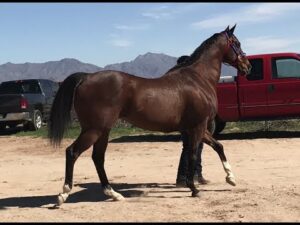Horse racing is one of the most popular sports in the world.
Even if you don’t know much about horse racing, you’ve probably asked this question before: How much does a racehorse weigh?
This blog post provides some great information on what racehorses weigh in kg and pounds. So, let’s get started.
Average Weight of a Racehorse
| Breed | Weight in lbs and kg |
| Thoroughbreds | 1,100 lbs (498 kg) |
| Quarter Horses | 1,000 lbs (453 kg) |
| Standardbreds | 1,000 lbs (453 kg) |
| Arabians | 900 lbs (408 kg) |
Thoroughbreds

A Thoroughbred is typically a 1,000 to 1100-pound horse. Factors that can influence their weight include feed consumption and exercise habits while breeding age also comes into play for these majestic animals who live up to 25 years on average!
It is often said that Thoroughbred racehorses at the beginning of their careers are smaller than they will be later. This may seem like a strange fact, but there’s actually logic behind it! A horse in its early years finds itself on an upswing with all aspects related to weight development; meaning you can expect more growth spurt activity before maturity sets in for good (or bad).
However as time progresses and these horses grow older- which brings us back around again -their average weights change dramatically based on any number of factors including age diet hours spent exercising or racing training status among others.
The Thoroughbred is a smaller racehorse breed with long legs and broad chests. They are known for their muscular build that makes them ideal to drive races at high speeds over a distance.
Racing Thoroughbreds tend towards being slightly lighter than other breeds because they have less muscle mass on average which would make them slower if running longer distances.
A Thoroughbred is typically a 1,000 to 1100-pound horse. Factors that can influence their weight include feed consumption and exercise habits while breeding age also comes into play for these majestic animals who live up to 25 years on average!
It is often said that Thoroughbred racehorses at the beginning of their careers are smaller than they will be later. This may seem like a strange fact, but there’s actually logic behind it! A horse in its early years finds itself on an upswing with all aspects related to weight development; meaning you can expect more growth spurt activity before maturity sets in for good (or bad).
However as time progresses and these horses grow older- which brings us back around again -their average weights change dramatically based on any number of factors including age diet hours spent exercising or racing training status among others.
The Thoroughbred is a smaller racehorse breed with long legs and broad chests. They are known for their muscular build that makes them ideal to drive races at high speeds over a distance.
Racing Thoroughbreds tend towards being slightly lighter than other breeds because they have less muscle mass on average which would make them slower if running longer distances.
Quarter Horses
Arabians are known for their endurance, not speed. They can weigh as much as 1,000 pounds and still be fast enough to win races!
The average weight of an adult Arabian horse is 800-1,000 lbs.
Racing Arabian’s aren’t very common in America but instead, they’re more prevalent down under where racing lasts longer than other places that have shorter tracks/days so horses will need a strong build with stamina because these animals don’t rely just on horsepower as we do here.
FAQ’s
How heavy do you have to be to ride a horse?
Horses can comfortably carry a weight that’s 20% of their own, which means if you weigh 250 pounds then the perfect horse should be around 1,250lbs. They need to have good balance and muscle control in order for this rule to work properly!
How much weight can a horse lose in a race?
The average horse can lose up to 5% of his body weight in one mile. For the Thoroughbred, this equates to more than 50 lbs – most are fluid!
What does weight for age mean in horse racing?
Weight for age is a way to compensate younger horses and enable them to compete with older counterparts. It allows these less mature animals the same chance at success as their elders, by giving an allowance based on how they perform during races or shows.
Conclusion
Racehorses are a type of horse that is uniquely suited for racing. They have a number of qualities that make them great race horses, including their lightweight and athleticism.
Most breeds stand around 15-16 hands tall and weigh about 1,000 pounds with Thoroughbreds being the most popular breed used in racing today



